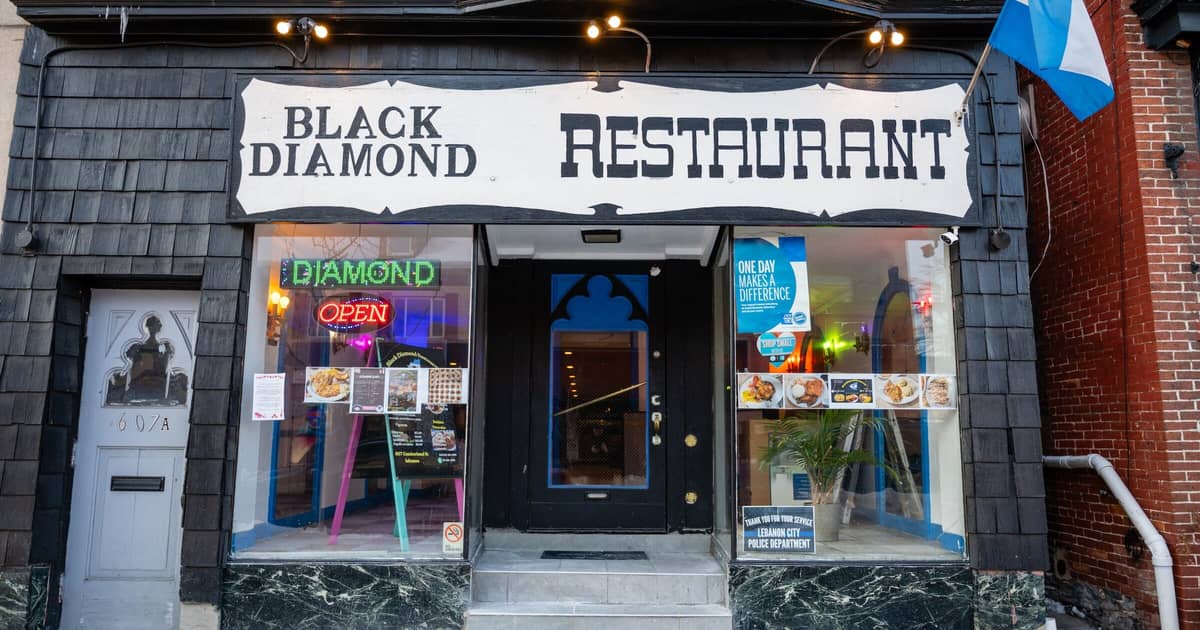This article was funded by LebTown donors as part of our Civic Impact Reporting Project.
At the West Cornwall Township meeting in September, supervisors voted to approve a new zoning ordinance adding a mixed-use overlay to the former Quentin Riding Club property.
The new ordinance allows for three-story garden apartments in West Cornwall Township, and changes the Mount Gretna Campmeeting zoning from R2 to R4.

Read More: West Cornwall Township supervisors close public hearing on zoning update
Quentin residents raise concerns about new zoning ordinance
Following the meeting, a Scenic Ridge resident, along with some of his neighbors, reached out to LebTown about their concerns.
Otto Leinhauser moved to Lebanon County from Bucks County four years ago. As a new member of the community, Leinhauser said he got involved by reading the local newspaper and attending township meetings.
His interest in the workings of the township was piqued at a West Cornwall Township supervisors’ meeting last summer.
“I saw the proposal being done by Landmark Homes to build the apartments at the junction of routes 322 and 419 here in Quentin,” Leinhauser said. “At the same supervisors’ meeting, there was a presentation given by Louis Hurst’s organization. … [Louis Hurst] was the individual that purchased the Quentin Riding Club.”
Under the old zoning ordinance, Hurst and Landmark Homes would have been required to obtain several variances to move forward with their projects. The new zoning ordinance covers their projects, removing the requirement for variances.
The mixed-use overlay of the new zoning ordinance gives Hurst the option to develop the Quentin Riding Club property based on the underlying low-density residential zoning or the mixed-use allocations. This could include a small gas station, commercial stores, an equine therapy center, age-restricted apartments, and houses.
Leinhauser contends the changes give Louis Hurst free reign on developing the property. However, West Cornwall Township officials disagree with his assessment.
Officials say mixed-use overlay doesn’t eliminate any requirements such as plans or hearings
David Lloyd, a West Cornwall Township supervisor, spoke with LebTown about the board of supervisors’ decision to approve the ordinance.
“[The previous West Cornwall Township zoning ordinance] hasn’t been modified, really, since 1979,” Lloyd said. “And it was the supervisors’ feelings that we needed to enter the 21st century and take a look and revise the ordinance.”
“Both the 419 and the Riding Club have not submitted any plan to the township. So, these pieces are on speculation,” Lloyd said. “But no, in the mixed-use, it calls for supervisors to have a hearing on some of the uses. It doesn’t eliminate anything at all.”
Russell Gibble, chairman of the West Cornwall Township board of supervisors, declined to comment.
LebTown also spoke with West Cornwall Township zoning officer Jeff Steckbeck about the new ordinance. Steckbeck has been the West Cornwall Township engineer since 1990, as well as manager of the West Cornwall Township Municipal Authority, which operates the sewage system and, soon, the water system. Steckbeck’s company, Steckbeck Engineering & Surveying Inc., is also located in West Cornwall Township, where it employs 30 people.
Steckbeck said that the current zoning ordinance was in place since 1979, and that he had recommended a new zoning ordinance about a year ago.
“In 2021, the township supervisors adopted a new comprehensive plan that was developed by Gannett Fleming for the Cornwall-Lebanon regional group,” said Steckbeck. “That regional comprehensive plan recommended zoning changes, and that’s what compelled me to make the recommendation to move ahead with the new zoning map and the ordinance.”

Fire safety and water supply brought up as risks, but officials say not to worry
Leinhauser also made the argument that the Quentin Volunteer Fire Company can’t fight a fire on a three-story building, and that Cornwall has to be called in those cases because their fire company is equipped to fight a three-story fire.
However, Stanley Singer, fire chief of the Quentin Volunteer Fire Company, said whether a structure has two or three stories, Cornwall, Mount Gretna, and Quentin fire companies would be the initial response.
“The box, as we call it, would stay the same,” Singer said.
“The size of the structure would have no bearing on the equipment called or the initial dispatch,” he added. “The size of the structure would have a bearing, though, if it was like a fully involved fire that had mutual aid coming in as far as how far out we went. And that would have more to do with modern staffing than it would be the size of the building.
“Our concerns [with the higher residential density] would be staffing and initial response. We do our best to get out on every alarm. But with the way that society is now and the lack of volunteers, it’s hard to guarantee that we would have a fully staffed apparatus for any incident, whether it’s the new stuff or the old stuff.”
The chief concluded, “As the fire company, we welcome the growth in township as it does bring potential for higher relief funds and the possibility of more volunteers joining the company as people move into the area.”
Steckbeck said that building up instead of out saves land compared to the use of the ground for a single-story building. The proliferation of sprinklers in building codes has also enhanced fire protection and made planners more likely to recommend going up instead of going out for new development.
Steckbeck noted that this developmental trend is also happening with North Cornwall Commons, situated across from the Expo Center. A few years ago, developers were permitted to build up to two and a half stories. With the installation of sprinklers, developers are now permitted to build up to five-story apartment buildings.
Leinhauser also cited concerns about the ability of the Quentin Water Company to keep up with development. However, William Matthews declined to comment on behalf of the Quentin Water Company on the implications of the new ordinance.
Steckbeck said that the water system in Quentin was only using 60,000 gallons a day of its capacity in August and September, out of 113,200 permitted capacity. Steckbeck said that the addition of another 200 or 300 dwelling units is not going to place a restriction or impose a problem on the water company.
Quentin attracts new residents for a quaintness that’s hard to preserve
In general, Leinhauser said he feels as though the negotiations with Hurst and Landmark Home’s variances were opportunities that could have been better used for the good of West Cornwall Township residents and that the supervisors forfeited these opportunities with the new zoning ordinance.
Steckbeck disagrees.
“I believe the mixed-use overlay actually gives the supervisors more control,” Steckbeck said. “There’s a two-step hearing process that the developer has to undertake. He has to go through special exception hearings with the zoning hearing board and conditional use hearings with the supervisors when he is ready to propose his uses that did not exist previously.”
Ultimately, Leinhauser and other Scenic Ridge residents who voiced their concerns to LebTown were motivated by worry of losing the Quentin they had come to know.
“I like the quaintness of Quentin. So, putting in apartment buildings next to where I live would profoundly affect me,” Leinhauser said.
Scenic Ridge is built on a 20-acre piece of ground known as the Mumma Farm, which has been zoned R2 since 1972. The part of the property left over after Scenic Ridge is now being proposed for apartment buildings.
“There’s concerns about traffic, concerns about apartment buildings going over there because of the transit, and other quality of life,” said Scenic Ridge resident Steven Skok.
“The biggest change is the existing R2 zoning allowed for garden apartments, which were two stories tall,” said Tom Whittle, another resident. “And the new ordinance changed that to allow for garden apartments that are up to three stories tall.”
Steckbeck said that the apartments are being built with the very same zoning has Scenic Ridge had, and that there’s been no special accommodations to give any new rights to the developer of the apartment project.
“Those rights were always the same,” said Steckbeck. “And in fact, the buyer of the Mumma piece that Scenic Ridge sits on could have also put in apartments, but he chose to go with single-family dwellings.
“So, the phrase is NIMBY, not in my backyard. They moved here in the last three to five years, and now they don’t want anybody else to move here.”
Steckbeck said that the idea of “what’s good for me is good for thee” should apply.
“They want to say, ‘Well, I got what I want. Now, I don’t want you to get what you want.’ That’s not the way it works,” he said.
At the West Cornwall Township supervisors’ meeting in August, Scenic Ridge residents presented a petition with 102 signatures in opposition to the new zoning ordinance.
“And then, the day of the original planning, when they brought Gannett Flemming in to give their presentations, there was no mention of these changes at all,” Skok said. “Their whole presentation was based on … the rezoning down at the Riding Club and at Gretna.”

Skok said that he and other residents were concerned about why the plans called for apartment buildings when single-family homes are more common in the area.
Steckbeck said that the previous zoning at the Quentin Riding Club, R1, would have permitted about 85 to 90 single-family dwellings, which would have been on new township-dedicated streets, resulting in added burden to schools and streets department.
“Given Louis Hurst’s flexibility to go to mixed-use development, he can instead propose to put in light commercial and elderly apartments, which will be located on private streets that the township doesn’t have to maintain,” said Steckbeck. “It will also provide for tax revenue to the school district but will bring no students into the school district.”
“Those were both things that the planner, the independent, objective planner, from Gannett Fleming recommended as good ideas. And then, the team … agreed with the planner.”
Steckbeck said that with the tax advantages, less impact on the school district, less requirements for the township to maintain roadways, but the same or more tax revenue, it actually becomes a more attractive development for the municipality than single-family homes.
Residents urge public involvement in planning process; officials say new zoning code up to modern standards
Considering all this, Leinhauser believes the new zoning ordinance would not have been approved if residents had attended the supervisors’ meetings, the planning commission meetings, and the zoning hearing board meetings and provided feedback.
“For everyone who went to the Quentin firehouse, the supervisors’ meeting, and aired their two cents, that’s good. That’s what citizenship, part of being a citizen, is: participation,” Leinhauser said. “But that participation was too late in the process. The earlier on we get involved in whether we’re talking about zoning or anything else that’s going on, the more frequently we’re involved, the earlier we’re involved, the better the process is going to turn out.”
Steckbeck said that Gannett Fleming’s team met with the township’s team during the course of development of the new zoning ordinance, with three supervisors, five planning commission members, and three zoning hearing board members participating for the township. Five public meetings were held, said Steckbeck, followed by a public hearing, all with much public participation.
“Residents from various areas of the township attended those team meetings,” said Steckbeck. “The planners from Gannett Fleming gave their recommendations and offered advice to bring the zoning ordinance and the zoning map into modern-day standards.”
Leinhauser urged residents to hold the supervisors to a greater standard of accountability by getting involved, attending meetings, reading the meeting minutes, and providing feedback.
Lloyd said the zoning ordinance benefits West Cornwall Township residents by tightening up a lot of open ends.
“It brings zoning up to the 21st century,” said Lloyd. “Some of the zoning was antiquated. It improves the system.”
Questions about this story? Suggestions for a future LebTown article? Reach our newsroom using the contact form below and we’ll do our best to get back to you.
We’re here to help make Lebanon County a better place.
LebTown is an independent media organization that provides timely, accurate, and comprehensive journalism intended to help people navigate their daily lives and promote the general well-being of Lebanon County.
Journalists are today a diminishing presence at the local level across the country, and the single most important metric for LebTown long-term will be the number of journalists we employ to cover Lebanon County.
You’re already supporting LebTown as a member. If you’re able, please consider making an extra one-time contribution this year.
Questions about this story? Suggestions for a future LebTown article? Reach our newsroom using the contact form below and we’ll do our best to get back to you.
Questions about this story? Suggestions for a future LebTown article? Reach our newsroom using this contact form and we’ll do our best to get back to you.

Keep local news strong.
Cancel anytime.
Monthly Subscription
🌟 Annual Subscription
- Still no paywall!
- Fewer ads
- Exclusive events and emails
- All monthly benefits
- Most popular option
- Make a bigger impact
Already a member? Log in here to hide these messages
Local news is disappearing across America, but not in Lebanon County. Help keep it that way by supporting LebTown’s independent reporting. Your monthly or annual membership directly funds the coverage you value, or make a one-time contribution to power our newsroom. Cancel anytime.
Full Disclosure: Steckbeck Engineering & Surveying, Inc., is an advertiser on LebTown. LebTown does not make editorial decisions based on advertising relationships and advertisers do not receive special editorial treatment. Learn more about advertising with LebTown here.























